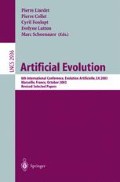Abstract
This paper explores the mapping process of the GAuGE system, a recently introduced position-independent genetic algorithm, that encodes both the positions and the values of individuals at the genotypic level. A mathematical formalisation of its mapping process is presented, and is used to characterise the functional dependency feature of the system. An analysis of the effect of degeneracy in this functional dependency is then performed, and a mathematical theorem is given, showing that the introduction of degeneracy reduces the position specification bias of individuals. Experimental results are given, that backup these findings.
Access this chapter
Tax calculation will be finalised at checkout
Purchases are for personal use only
Preview
Unable to display preview. Download preview PDF.
References
Bagley, J.D.: The behaviour of adaptive systems which employ genetic and correlation algorithms. Doctoral Dissertation, University of Michigan (1967)
Banzhaf, W.: Genotype-Phenotype-Mapping and Neutral Variation - A case study in Genetic Programming. In: Davidor, Y., Männer, R., Schwefel, H.-P. (eds.) PPSN 1994. LNCS, vol. 866, pp. 322–332. Springer, Heidelberg (1994)
Bean, J.: Genetic Algorithms and Random Keys for Sequencing and Optimization. ORSA Journal on Computing 6(2), 154–160 (1994)
Goldberg, D.E., Korb, B., Deb, K.: Messy genetic algorithms: Motivation, analysis, and first results. Complex Systems 3, 493–530 (1989)
Harik, G.: Learning Gene Linkage to Efficiently Solve Problems of Bounded Difficulty Using Genetic Algorithms. Doctoral Dissertation, University of Illinois (1997)
Holland, J.H.: Adaptation in Natural and Artificial Systems. University of Michigan Press, Ann Arbor (1975)
Kalos, M.H., Withlock, P.A.: Monte Carlo Methods, vol. 1. Wiley, Chichester (1986)
Kimura, M.: The Neutral Theory of Molecular Evolution. Cambridge University Press, Cambridge (1983)
Nicolau, M., Ryan, C.: LINKGAUGE: Tackling hard deceptive problems with a new linkage learning genetic algorithm. In: Langdon, et al. (eds.) Proceedings of the Genetic and Evolutionary Computation Conference GECCO 2002, pp. 488–494. Morgan Kaufmann Publishers, San Francisco (2002)
Nicolau, M., Ryan, C.: How Functional Dependency Adapts to Salience Hierarchy in the GAuGE System. In: Ryan, C., Soule, T., Keijzer, M., Tsang, E.P.K., Poli, R., Costa, E. (eds.) EuroGP 2003. LNCS, vol. 2610, pp. 153–163. Springer, Heidelberg (2003)
Oliver, I.M., Smith, D.J., Holland, J.R.C.: A Study of Permutation Crossover Operators on the Traveling Salesman Problem. In: Proceedings of the Second International Conference on Genetic Algorithms, pp. 224-230 (1987)
O’Neill, M., Ryan, C., Keijzer, M., Cattolico, M.: Crossover in Grammatical Evolution. Genetic Programming and Evolvable Machines 4(1), 67–93 (2003)
O’Neill, M., Ryan, C.: Grammatical Evolution - Evolving programs in an arbitrary language. Kluwer Academic Publishers, Dordrecht (2003)
O’Neill, M., Ryan, C.: Grammatical Evolution. IEEE Transactions on Evolutionary Computation 5(4), 349–358 (2001)
Ryan, C., Collins, J.J., O’Neill, M.: Grammatical Evolution: Evolving Programs for an Arbitrary Language. In: Banzhaf, W., Poli, R., Schoenauer, M., Fogarty, T.C. (eds.) EuroGP 1998. LNCS, vol. 1391, pp. 83–95. Springer, Heidelberg (1998)
Ryan, C., Nicolau, M., O’Neill, M.: Genetic Algorithms using Grammatical Evolution. In: Foster, J.A., Lutton, E., Miller, J., Ryan, C., Tettamanzi, A.G.B. (eds.) EuroGP 2002. LNCS, vol. 2278, pp. 278–287. Springer, Heidelberg (2002)
Author information
Authors and Affiliations
Editor information
Editors and Affiliations
Rights and permissions
Copyright information
© 2004 Springer-Verlag Berlin Heidelberg
About this paper
Cite this paper
Nicolau, M., Auger, A., Ryan, C. (2004). Functional Dependency and Degeneracy: Detailed Analysis of the GAuGE System. In: Liardet, P., Collet, P., Fonlupt, C., Lutton, E., Schoenauer, M. (eds) Artificial Evolution. EA 2003. Lecture Notes in Computer Science, vol 2936. Springer, Berlin, Heidelberg. https://doi.org/10.1007/978-3-540-24621-3_2
Download citation
DOI: https://doi.org/10.1007/978-3-540-24621-3_2
Publisher Name: Springer, Berlin, Heidelberg
Print ISBN: 978-3-540-21523-3
Online ISBN: 978-3-540-24621-3
eBook Packages: Springer Book Archive

